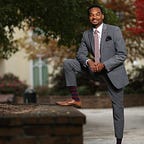Are we Rising or Falling?
The fate of the beloved Black colleges and universities
In honor of Black History month and Historically Black Colleges and Universities, The Public Broadcasting Service (PBS) premiered a documentary titled Tell them we are Rising. The film, which illustrates the creation, influence and evolution of these prestigious institutions offers an introspective view of that many have never been privy to. One of the most striking factors within the film, was the realization of the state of HBCUs today.
When thinking of the fate of Black people during those unbearable and horrific periods of history (see: civil war and reconstruction era), HBCUs stood as gleams of light situated within darkness. With excessive racism, bigotry and violence toward Black people, having a place to call home alleviated some of those pressure. That same home offered (and still does offer) a sense of resilience and yearning for knowledge.
As the years have progressed, that light has grown exponentially brighter. It started with the ability to understand letters and numbers. Next was gaining the ability to read and write.Then those skills fermented themselves into the building of classrooms, and though Black people still struggled with racist whites fearing a strong black mind, HBCUs and their students excelled at any and every obstacle they faced.
One statement remains true, “education is freedom.”
That freedom translated itself into our beloved institutions, that still serve as home to many Black and Brown students seeking truth and representation today. Conceived during post Civil War and the Reconstruction era; Cheyney, Lincoln (Pennsylvania), Harris-Stowe, Morehouse and Fisk were some of the premier institutions that began what would become a nation-wide cohort of Black excellence. This blinding beam has worked for over 180 years, piercing through the darkness and creating new horizons for the Black folks by-and-large.
Tell Them We Are Rising also made visible, the many challenges HBCUs have been met with. From the debate of the future of the Black race as discussed by W.E.B DuBois and Booker T. Washington: The Talented Tenth versus a vocational education, to the necessity of alumni engaging and giving back.
The ideal(s) of building our wealth with an educated workforce versus that of pushing the top intellectual scholars to represent the community as a whole, was in constant conversation and seemingly hard to gage by many. Dubois did not want to see Black people take a step back with the supposed subordinate roles offered by Washington. Instead Dubois favored taking control of their education, political and financial role in America with the Talented Tenth.
Even though this caused a short rift in the shaping of the Black community, the strength of HBCUs still prevailed (and is prevailing) for over a century and a half. Ultimately, establishing over a hundred HBCUs across the country.
Unfortunately, as one begins to fast forward toward the present, the future does not look as bright as it once did for HBCUs as over 10 HBCUs have closed their doors, the newest addition to that list is Concordia College in Alabama. While, other institutions have faced close calls and are dealing with financial hardships. From the oldest HBCU Cheyney University to the “Mecca” Howard University, HBCUs are fighting tooth and nail to stand tall.
It brings into question, if the Black community is doing all it can to support these historic atmospheres of high and exceptional learning. Do students of today have the same zeal and tenacity of their ancestors? Is the thirst for knowledge still the expectation?
Some might say no, especially when situations such as that of Hampton University arise. On February 22, 2018, students of Hampton University in Virginia, raged their concerns in a campus town hall, after seeing various administrative and infrastructure problems that were being unattended by the university.
The student took to twitter to spread the unfavorable news in the hashtag #HUTownHall (the images below are only a few of the problems that students have been enduring).
So, “Where Do We Go From Here: Chaos or Community,” as proposed by Dr. Martin Luther King Jr. Out of the respect for the blood, sweat and tears of the Black people who risked their lives for Black students today to be able to have access to education, students and Alumni alike should be pulling together in droves to ensure they [HBCUs] not only survive, but thrive for generations to come.
“This HBCU experience has shown me and taught that anything and everything is possible with that one spark,” Florida A&M student Calvin Long stated in the film saying the HBCU experience was similar to a oven match.
That spark needs to return and the mantal needs to be taken up to support and expand the reach of these esteemed Historically Black Colleges and Universities.
Watch the PBS special online.
Roderick Diamond II Junior at Morehouse College
